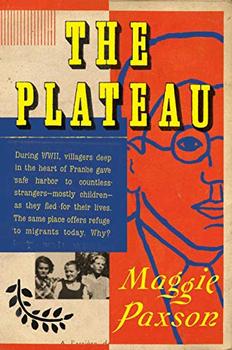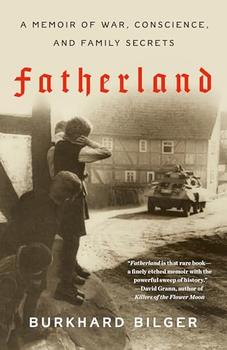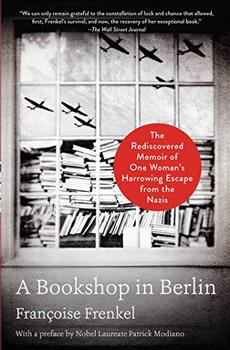Summary | Excerpt | Reviews | Beyond the book | Read-Alikes | Genres & Themes | Author Bio

 Book Reviewed by:
Book Reviewed by:
Elisabeth Cook
Buy This Book
Why did the inhabitants of a particular French village offer safe harbor to Jewish people and other vulnerable populations during World War II? Why might certain communities or individuals be disposed to risk their own lives for the sake of helping those in need?
These questions serve as the intriguing catalyst for Maggie Paxson's The Plateau, in which Paxson, a self-described "lapsed anthropologist," recounts how she became tired of encountering stories of violence in her work and set out to study the conditions that create and foster peace.
With this goal in mind, Paxson was inspired to investigate a story from her own family history—that of the Trocmés. Daniel, André and Magda Trocmé, relatives of Paxson's, played instrumental roles in WWII rescue and refuge efforts in Le Chambon-sur-Lignon, a village located on the Vivarais Plateau of south-central France. They would eventually be honored as Righteous Among the Nations by Israel's Holocaust remembrance organization, Yad Vashem (see Beyond the Book).
It quickly becomes clear that The Plateau won't be a straightforward investigation of the cultural particulars of a place. Instead, it reads as part memoir, part travelogue, part history book and part casual anthropological commentary. We learn some of the intimate details of Paxson's life, such as specifics from her childhood in Rochester, New York, while also gaining insight into her scientific mind and how she considers the core anthropological question of "Who does what with whom?"
Initially, the book's various parts work well together. In her examination of historical events, Paxson primarily follows Daniel Trocmé, a teacher who oversaw one home for child refugees and another for displaced young men in Le-Chambon-sur-Lignon. The Plateau pieces together Daniel's correspondence, Paxson's research and educated speculation to create an engaging, mostly chronological narrative showing his dedication to those he protected. Paxson also provides vivid portraits of the young people Daniel came into contact with, which give weight to the tragedies many of them would and already had experienced.
This narrative is interwoven with Paxson's own experiences traveling to and staying in Le Chambon-sur-Lignon, which transform the text as it unfolds. Feeling reluctant to treat the villagers as mere subjects in a study, she begins to drift away from her initial intention of investigating the conditions that foster peace. Her investigation becomes more internal, and she reflects on the question of her own capacity for goodness.
The author does an impressive job of bringing the village, both past and present, to life, all while letting the reader tag along on the personal journey she undertakes in exploring its story. She eventually discovers that the villagers not only have a history of welcoming those seeking refuge, but that they still make a point of offering shelter to immigrants fleeing dangerous situations. It's rewarding to observe how Paxson allows her deepening connections with the villagers and local refugees to change, inform and even derail her plans. Along with the author, we begin to see how perhaps the answer to fostering peace lies not in a particular list of conditions, but a deeper interrogation of ourselves and our actions.
Unfortunately, it's in this deeper interrogation that The Plateau loses its bearings. Paxson's personal reflections sometimes turn outward into sweeping and confusing assertions about humanity when it seems they might have more naturally continued inward into analysis of her own struggles. For example, she expresses concern about the "moral hazard" of identifying as a member of any group before identifying as human, stating that "the oneness of humanity is an absolute truth." It seems important to acknowledge, alongside this statement, that groups in power have often used people's religious and ethnic identities as reason to treat them inhumanely. This truth is evident in the stories of the modern-day refugees Paxson comes into contact with, as well as those who took shelter in the village from the Nazis. One could therefore just as well argue that respecting the importance of everyone's group identities—something groups dedicated to the dehumanization of others generally eschew—is absolutely crucial to showing each other humanity.
To be fair, Paxson never states that group identity is in itself problematic, and she may be primarily concerned with how those in positions of power or privilege should regulate their relationships with their own identities. But this is never made entirely clear. Another broad assertion suggests a lack of concern for the dynamic of oppressed vs. oppressor: Referencing anti-government protests in Istanbul, Paxson describes "everyone, on all sides" as having been "righteous and indignant," and spins this into an even more general statement:
It's no use, this business of raising fists and pinging glasses or clattering pots and pans, however genteel it all may feel, however lofty the object, however sweet-seeming the fruit. It's all the same rough beast.
It's hard to understand what exactly Paxson is admonishing here. Earlier on, she writes about non-violent resistance, a stance she appears to share with André Trocmé and others from Le Chambon-sur-Lignon. But this sounds like a blanket criticism of protest. Is pinging a glass violent? Was the protest culture of the Plateau villagers acceptable because it fell into the realm of passive resistance? What does it take to clear a non-violent protester with a legitimate grievance of charges of righteousness and indignation?
Statements that raise questions like these tend to appear later on in the The Plateau, and seem to speak to some attempt at personal or spiritual truth. However, they come across as all-encompassing and conclusive, so the lack of weighted perspective and clarity is concerning. They also seem cynical and closed-off in contrast to the book's earlier openness, which is disappointing.
If we take Paxson's own anthropological advice and pay attention to "who does what with whom," we can observe that the answers to her questions about how to be good are provided more effectively by her actions than her arguments. She shows us how life in the village affects her. She spends time with students and with refugee families. She offers time and resources to those in need, volunteering her translation services and making genuine connections in the process. Through these simple acts, it seems she may gain some of the guidance she sought from Daniel's story and the village itself.
The Plateau has generally received high praise in other reviews thus far. This isn't entirely surprising, as a large part of the book is committed to an absorbing and accessible story about people who exercised courage and resilience during a horrific series of events. That's arguably reason enough to recommend it, and it will undoubtedly be of interest to many readers. Based on a fertile premise, it should provide much fodder for rewarding thought and discussion. However, its inconsistencies and problematic framing make a close and critical reading necessary.
![]() This review
first ran in the September 4, 2019
issue of BookBrowse Recommends.
This review
first ran in the September 4, 2019
issue of BookBrowse Recommends.

If you liked The Plateau, try these:

by Burkhard Bilger
Published 2024
A New Yorker staff writer investigates his grandfather, a Nazi Party Chief, in this "unflinching, gorgeously written, and deeply moving exploration of morality, family, and war" (Patrick Radden Keefe, author of Empire of Pain).

by Francoise Frenkel
Published 2020
"A beautiful and important book" (The Independent) in the tradition of rediscovered works like Suite Française and The Nazi Officer's Wife, the prize-winning memoir of a fearless Jewish bookseller on a harrowing fight for survival across Nazi-occupied Europe.





The Funeral Cryer by Wenyan Lu
Debut novelist Wenyan Lu brings us this witty yet profound story about one woman's midlife reawakening in contemporary rural China.
Your guide toexceptional books
BookBrowse seeks out and recommends the best in contemporary fiction and nonfiction—books that not only engage and entertain but also deepen our understanding of ourselves and the world around us.